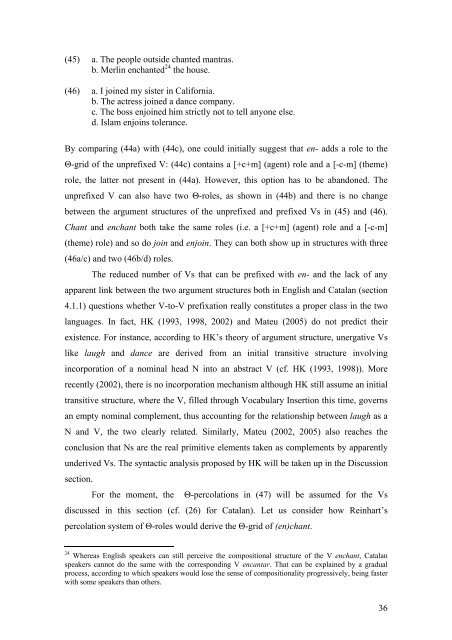Prefixation in English and Catalan - Departament de Filologia ...
Prefixation in English and Catalan - Departament de Filologia ...
Prefixation in English and Catalan - Departament de Filologia ...
Create successful ePaper yourself
Turn your PDF publications into a flip-book with our unique Google optimized e-Paper software.
(45) a. The people outsi<strong>de</strong> chanted mantras.<br />
b. Merl<strong>in</strong> enchanted 24 the house.<br />
(46) a. I jo<strong>in</strong>ed my sister <strong>in</strong> California.<br />
b. The actress jo<strong>in</strong>ed a dance company.<br />
c. The boss enjo<strong>in</strong>ed him strictly not to tell anyone else.<br />
d. Islam enjo<strong>in</strong>s tolerance.<br />
By compar<strong>in</strong>g (44a) with (44c), one could <strong>in</strong>itially suggest that en- adds a role to the<br />
Θ-grid of the unprefixed V: (44c) conta<strong>in</strong>s a [+c+m] (agent) role <strong>and</strong> a [-c-m] (theme)<br />
role, the latter not present <strong>in</strong> (44a). However, this option has to be ab<strong>and</strong>oned. The<br />
unprefixed V can also have two Θ-roles, as shown <strong>in</strong> (44b) <strong>and</strong> there is no change<br />
between the argument structures of the unprefixed <strong>and</strong> prefixed Vs <strong>in</strong> (45) <strong>and</strong> (46).<br />
Chant <strong>and</strong> enchant both take the same roles (i.e. a [+c+m] (agent) role <strong>and</strong> a [-c-m]<br />
(theme) role) <strong>and</strong> so do jo<strong>in</strong> <strong>and</strong> enjo<strong>in</strong>. They can both show up <strong>in</strong> structures with three<br />
(46a/c) <strong>and</strong> two (46b/d) roles.<br />
The reduced number of Vs that can be prefixed with en- <strong>and</strong> the lack of any<br />
apparent l<strong>in</strong>k between the two argument structures both <strong>in</strong> <strong>English</strong> <strong>and</strong> <strong>Catalan</strong> (section<br />
4.1.1) questions whether V-to-V prefixation really constitutes a proper class <strong>in</strong> the two<br />
languages. In fact, HK (1993, 1998, 2002) <strong>and</strong> Mateu (2005) do not predict their<br />
existence. For <strong>in</strong>stance, accord<strong>in</strong>g to HK’s theory of argument structure, unergative Vs<br />
like laugh <strong>and</strong> dance are <strong>de</strong>rived from an <strong>in</strong>itial transitive structure <strong>in</strong>volv<strong>in</strong>g<br />
<strong>in</strong>corporation of a nom<strong>in</strong>al head N <strong>in</strong>to an abstract V (cf. HK (1993, 1998)). More<br />
recently (2002), there is no <strong>in</strong>corporation mechanism although HK still assume an <strong>in</strong>itial<br />
transitive structure, where the V, filled through Vocabulary Insertion this time, governs<br />
an empty nom<strong>in</strong>al complement, thus account<strong>in</strong>g for the relationship between laugh as a<br />
N <strong>and</strong> V, the two clearly related. Similarly, Mateu (2002, 2005) also reaches the<br />
conclusion that Ns are the real primitive elements taken as complements by apparently<br />
un<strong>de</strong>rived Vs. The syntactic analysis proposed by HK will be taken up <strong>in</strong> the Discussion<br />
section.<br />
For the moment, the Θ-percolations <strong>in</strong> (47) will be assumed for the Vs<br />
discussed <strong>in</strong> this section (cf. (26) for <strong>Catalan</strong>). Let us consi<strong>de</strong>r how Re<strong>in</strong>hart’s<br />
percolation system of Θ-roles would <strong>de</strong>rive the Θ-grid of (en)chant.<br />
24 Whereas <strong>English</strong> speakers can still perceive the compositional structure of the V enchant, <strong>Catalan</strong><br />
speakers cannot do the same with the correspond<strong>in</strong>g V encantar. That can be expla<strong>in</strong>ed by a gradual<br />
process, accord<strong>in</strong>g to which speakers would lose the sense of compositionality progressively, be<strong>in</strong>g faster<br />
with some speakers than others.<br />
36
















